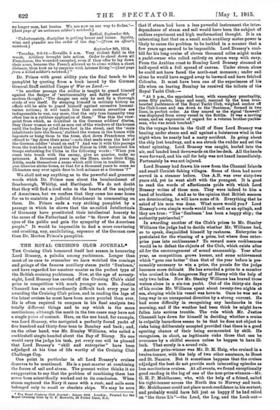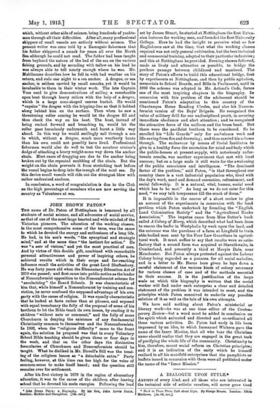THE ROYAL CRUISING CLUB JOURNAL" THE Cruising Club honoured itself
last season in honouring Lord Brassey, a paladin among yachtsmen. Longer than most of us care to remember we have watched the comings and goings of the famous auxiliary steam yacht ' Sunbeam,' and have regarded her amateur master as the perfect type of the British cruising yachtsman. Now, at the age of seventy- eight, Lord Brassey has carried off the Cruising Club's chief prize in competition with much younger men. Mr. Justice Channell has an extraordinarily difficult task every year in awarding the Cruising Club prizes, and in reading the loge of the latest cruises he must have been more puzzled than over, He is often required to compare in his final analysis two totally different things and to say which is the more meritorious, although the merit in the two cases may have not single point of contact. Here, on the one hand, for example, was Lord Brassey, who navigated a perfectly found yacht of five hundred and thirty-four tons to Bombay and back; and, on the other hand, was Mr. Stanley Williams, who sailed a cockleshell single-handed about the Bay of Biscay. No one would envy the judge his task, yet every one will be pleased that Lord Brassey's "skill and enterprise" have been adjudged at his time of life worthy of the Cruising Club Challenge Cup.
One point in particular in all Lord Brassey's cruises deserves to be mentioned. He is a past-master at combining the forces of sail and steam. The present writer thinks it no exaggeration to say that the problem of combining them has never been scientifically worked out to its conclusion. When steam captured the Navy it came with a rush, and sails soon belonged only to small or obsolete ships. We may be sure
2'nae ej=Se710LthPri'hei foe the Begin th,610ttri Lag, r.6.
that if steam bad been a less powerful instrument the inter- dependence of steam and sail would have been the subject of endless experiment and high mathematical thought. It is an interesting fact that on a small scale auxiliary motor-power is likely to cause the problem to be tackled in a manner that a few years ago seemed to be impossible. Lord Brassey's coal- bill for his long cruise of eleven thousand miles might make a yacht-owner who relied entirely on steam weep with envy. From the Arabian coast to Bombay Lord Brassey steamed at half-speed with a full spread of canvas. Under steam alone he could not have faced the north•east monsoon; under sail alone he would have sagged away to leeward and have fetched Colombo. It must have been one of the experiences of his life when on leaving Bombay he received the tribute of the Royal Yacht Club
"At 3 p.m., the appointed hour, with exemplary punctuality, some fifty yachts, large and small, manned by the keen true- hearted yachtsmen of the Royal Yacht Club, weighed anchor off the Club-house and ran down to the 'Sunbeam,' formed in two lines, in perfect order. As they neared us the signal 'farewell' was displayed from every vessel in the flotilla. It was a moving scene, and an expression of regard for a veteran brother-yachts- man, who was much touched."
On the voyage home in the Gulf of Sues Lord Brassey was beating under steam and sail against a boisterous wind in the night when he nearly had a nasty accident. In going about the ship lost headway, and a sea struck the rudder and set the wheel spinning. Lord Breese), was caught, hurled into the air, and landed head downwards on the lee deck. All the hands were forward, and bin call for help was not heard immediately. Fortunately he was not injured.
Lord Brassey had drawn his crew from the Channel Islands and small Cornish fishing villages. Some of them had never served in a steamer before. One A.B. was over sixty-two years old, yet he went aloft with the youngest. It is good to read the words of affectionate pride with which Lord Brassey writes of these men. They were indeed to him a band of brothers. And as to the opinion that British seamen are deteriorating, he will have none of it. Everything that he asked of his men was done. What more would you? Lord Brassey's own simple words would look well as an epitaph, and they are true " The ' Sunbeam' has been a happy ship ; the authority patriarchal."
In awarding another of the Club's prizes to Mr. Stanley Williams the judge had to decide whether Mr. Williams bad, so to speak, disqualified himself by rashness. Enterprise is postulated for the winning of a prize, but where does enter- prise pass into recklessness P To reward mere recklessness would be to defeat the objects of the Club, which exists after all for the encouragement of sound seamanship. Year after year, as competition grows keener, and some achievement which "goes one better" than that of the year before is pre- sumably necessary to win a prize, the puzzle for the judge becomes more delicatd. He has awarded a prize to a member who cruised in the dangerous Bay of Biscay with the help of only two ladies. Now Mr. Stanley Williams has braved those waters alone in a six-ton yacht. Out of the thirty-six days of his cruise Mr. Williams spent about twenty-two nights at sea, sleeping while his vessel was hove-to. Once he was set a long way in an unexpected direction by a strong current. He had some difficulty in recognizing any landmarks in the morning, and if the weather had been thick he might have fallen into serious trouble. The rule which Mr. Justice Channel lays down for himself in deciding whether a cruise is culpably hazardous seems to be that he does not object to risks being deliberately accepted provided that there is a good sporting chance of their being surmounted by skill. He recognizes, in short, as legitimate risks those that can be overcome by a skilful seaman unless he happen to have
ill-
luck. That surely is a sound rule.
Another prize-winner was Mr. D. 3L Haig, who cruised in a twelve-tonner, with the help of two other amateurs, to Brest and St. Nazaire. But it sometimes happens that the cruises adjudged the best do not provide such interesting episodes as less meritorious cruises. At all events, we found exceptionally good reading in the log of one of the non-prize-winners—Mr. G. H. P. Muhlhauser, who, with the help of a friend, sailed his eight-toner across the North Sea to Norway and back. Mr. Muldhauser could not place much confidence in his sextant, and probably would have felt just as happy if be had relied on "the three L's "—the Lead, the Log, and the Look-out- which, without other aids of science, bring hundreds of yachts- men through all their difficulties. After all, many professional skippers of small vessels are entirely without science. The present writer was once told by a Ramsgate fisherman that his father skippered a smack for years all over the North Sea although he could not read. The father had been taught from boyhood the nature of the bed of the sea on the various fishing grounds, and by sounding with tallow on his lead he was always able to tell nearly enough where he was. Mr. Muhlbanser describes how he fell in with bad weather on his return, and rode one night to a sea anchor. A drogue, or sea anchor, is seldom carried by small smacks, yet it would be invaluable to them in their winter work. The late Captain Voss used to give demonstrations of sailing a ramshackle open boat through heavy rollers with the help of a drogue, which is a large cone-shaped canvas bucket. He would "capsize" the drogue with the tripping-line so that it bobbed along behind him on the surface. Then when he saw a threatening roller coming be would let the drogue fill and thus check the way on his boat. The boat, instead of being rushed forward and broaching to, would let the roller pass harmlessly underneath and burst a little way ahead. In this way he would smilingly sail through a sea in which, without a drogue, much more weatherly boats than his own could not possibly have lived. Professional fishermen would also do well to test the amateur cruiser's dodge of attaching a heavy weight some way down the anchor chain. Most cases of dragging are due to the anchor being broken out by the repeated snubbing of the chain. But the weight on the chain prevents it from stretching taut before the vessel begins to drop into the trough of the next sea. By this device small vessels will ride out the strongest blow with rather undersized anchors.
In conclusion, a word of congratulation is due to the Club on the high percentage of members wbo are now serving the country as Volunteers at sea.



































 Previous page
Previous page